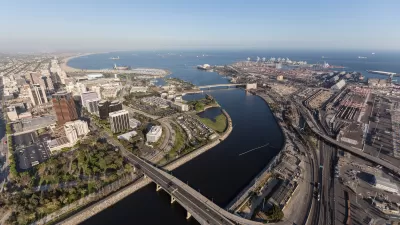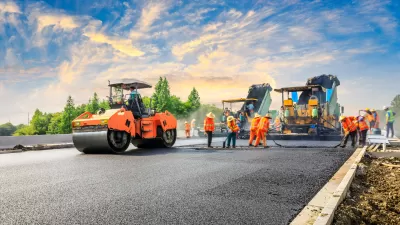At some point in the past 35 years, the word infrastructure became common in policy discussions and even in the common tongue. But why did we suddenly prefer the word "infrastructure" to other terms like "public works"?
Alex Marshall pens an article inspired by the word "Infrastructure" and its strange rise to prominence over the past 50 years. According to Marshall, "this word 'infrastructure,' which I just managed to use five times in one paragraph without explanation, was not in common discourse 35 years ago in the U.S. and was just about unknown 50 years ago. Where did it come from, and what does its rise mean?"
To back up that claim, Marshall uses Google's Ngram Viewer, discovering that in English, "'infrastructure' was hardly used until about 1960, after which it climbed steadily, taking off after 1980."
So what does it mean, that the word has taken a much more prominent place in the common lexicon? "For me, the way this new word rose up and replaced older terms like 'public works' is interesting and significant. Building roads and bridges where none existed before – 'public works' -- is one thing. Viewing such projects as interconnected, mutually dependent systems that move us from place to place and serve as a primary engine of commerce – 'infrastructure' -- is quite another."
The article includes more evidence about how the usage of the word infrastructure has changed over the years along with more of the implications of that evolution.
FULL STORY: Why the Word ‘Infrastructure’ Replaced 'Public Works'

Planetizen Federal Action Tracker
A weekly monitor of how Trump’s orders and actions are impacting planners and planning in America.

San Francisco's School District Spent $105M To Build Affordable Housing for Teachers — And That's Just the Beginning
SFUSD joins a growing list of school districts using their land holdings to address housing affordability challenges faced by their own employees.

The Tiny, Adorable $7,000 Car Turning Japan Onto EVs
The single seat Mibot charges from a regular plug as quickly as an iPad, and is about half the price of an average EV.

Austin's First Single Stair Apartment Building is Officially Underway
Eliminating the requirement for two staircases in multi-story residential buildings lets developers use smaller lots and more flexible designs to create denser housing.

Atlanta Bus System Redesign Will Nearly Triple Access
MARTA's Next Gen Bus Network will retool over 100 bus routes, expand frequent service.

Toronto Condo Sales Drop 75%
In two of Canada’s most expensive cities, more condos were built than ever — and sales are plummeting.
Urban Design for Planners 1: Software Tools
This six-course series explores essential urban design concepts using open source software and equips planners with the tools they need to participate fully in the urban design process.
Planning for Universal Design
Learn the tools for implementing Universal Design in planning regulations.
Smith Gee Studio
City of Charlotte
City of Camden Redevelopment Agency
City of Astoria
Transportation Research & Education Center (TREC) at Portland State University
US High Speed Rail Association
City of Camden Redevelopment Agency
Municipality of Princeton (NJ)





























